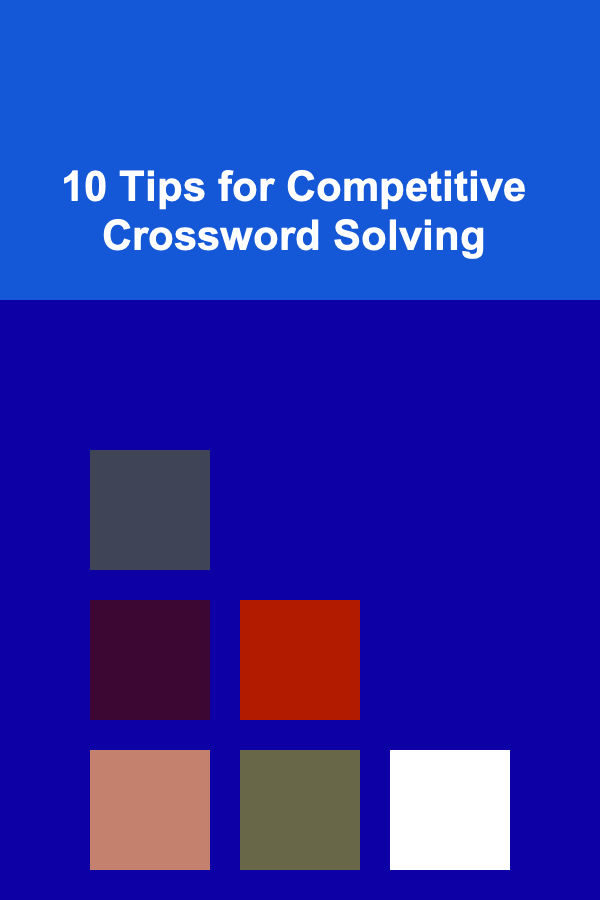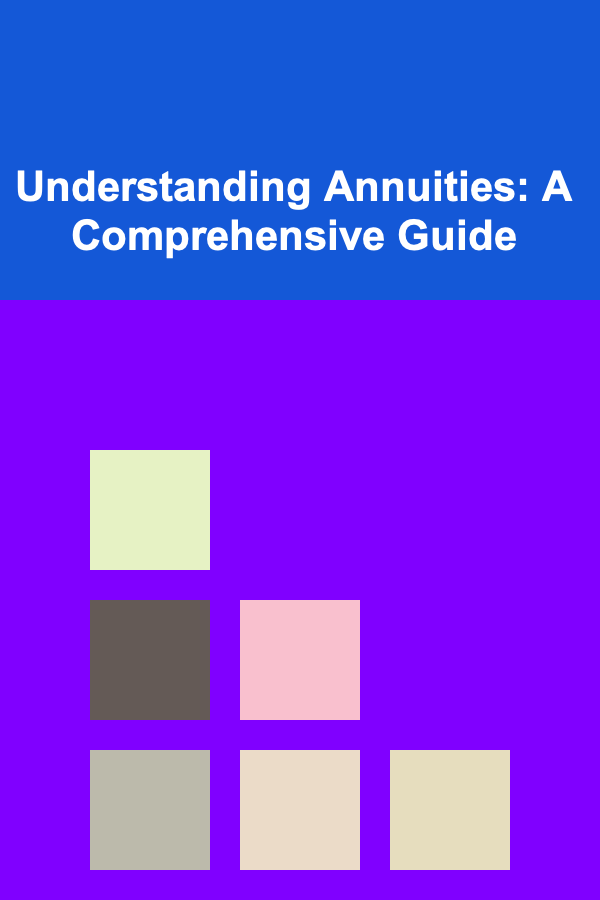
10 Tips for Competitive Crossword Solving
ebook include PDF & Audio bundle (Micro Guide)
$12.99$8.99
Limited Time Offer! Order within the next:

Crossword puzzles have long been a popular pastime, providing both a fun and intellectually stimulating challenge. For those who take their crossword-solving seriously, whether as a hobby or as part of a competitive pursuit, mastering the art of solving is a skill that requires patience, strategy, and practice. Competitive crossword solvers push their boundaries and constantly refine their techniques to achieve better times, accuracy, and efficiency. In this article, we'll explore ten essential tips that can help both beginners and seasoned solvers improve their performance in competitive crossword events.
Master the Basics of Crossword Construction
Before diving into strategies for solving, it's important to understand the basics of crossword construction. Knowing how crossword puzzles are built can give you a major advantage in solving them quickly and accurately.
Crossword puzzles are usually divided into horizontal (across) and vertical (down) clues, each corresponding to a set of squares on the grid. The answers often follow certain rules, such as:
- Letter patterns: Many crossword answers have common letter combinations or prefixes and suffixes that can help guide your solving.
- Word length: The number of squares often provides a major clue toward the solution. For example, a four-letter word might suggest a common short word, like "time" or "into."
- Clue types: Clues often follow certain conventions like synonyms, definitions, wordplay, anagrams, or even homophones.
By gaining a strong understanding of how puzzles are constructed, you'll be able to predict potential answers more accurately and quickly.
Learn Common Crossword Abbreviations and Shortened Words
Crossword puzzles often rely on abbreviations and shortened forms of words to fit the grid. These can range from standard abbreviations like "Ave." for "Avenue" to more obscure forms like "PS" for "postscript" or "P" for "piano" in musical notation.
Here are some common abbreviations you might encounter:
- Prefixes and suffixes: "Un-", "re-", "-ed", "-ing"
- Countries and cities: "USA" for United States of America, "NYC" for New York City
- Time indicators: "AM" for ante meridiem, "PM" for post meridiem
- Common short words: "AGT" for "agent", "EMT" for "emergency medical technician"
Being able to recognize these abbreviations quickly can save you valuable time during a competition, allowing you to fill in clues without second-guessing yourself.
Develop Your Vocabulary
A broad vocabulary is one of the most valuable tools in a competitive crossword solver's arsenal. Crossword constructors often draw upon a wide range of words, from everyday language to obscure and uncommon terms. Solvers who are well-read in various fields such as literature, science, history, and the arts will have an advantage when it comes to solving clues.
Here are some tips for expanding your vocabulary:
- Read widely: Reading books, newspapers, and articles from different subjects will expose you to new words and phrases that might appear in puzzles.
- Learn word lists: Memorizing lists of useful crossword words (e.g., two-letter words, rare but common crossword entries) can help you fill in tricky spots.
- Use a crossword dictionary: These specialized dictionaries contain frequently used words and abbreviations that appear in crossword puzzles.
Use Word Patterns and Letter Combinations
One of the easiest ways to speed up your solving process is by looking for common letter patterns. This will help you guess potential answers even when you don't know the exact word. For example:
- Double letters: Many crossword answers feature double letters like "LL" or "EE." For example, "all" or "beer."
- Common prefixes and suffixes: If you're stuck on a word with a specific number of squares, look for common prefixes or suffixes that might complete the word, such as "pre-" for five-letter words or "-est" for superlative adjectives.
By looking for letter combinations and word patterns, you can often make educated guesses about potential answers, speeding up your solving time.
Start with the Easy Clues
Competitive crossword solvers should start by focusing on the easiest clues first. These are usually the ones that are most straightforward or have a very high probability of being correct. For example, clues that are very general or rely on popular culture references are often the easiest to solve.
Once you've filled in the easier clues, you'll have more letters in place to help you solve the more difficult ones. This will create a domino effect, where solving one clue can help you figure out others.
Solve the Theme First
Many crosswords, especially in competitions, have a theme that ties the clues together. Identifying the theme early can provide crucial context for solving the puzzle. For example, the theme might be related to a specific category, such as famous artists, countries, or classic literature. If you can identify the theme, it will give you clues about what types of words are likely to appear in the puzzle, which can help you make educated guesses.
When solving themed puzzles, try to identify the theme as early as possible. This might involve answering some of the longest or most central clues, as they're often related to the theme.
Don't Get Stuck on One Clue
One of the biggest mistakes that competitive solvers make is getting stuck on a single clue. It's easy to spend several minutes trying to figure out the answer to a particularly tough clue, but this can waste valuable time.
If you find yourself stumped, try moving on to a different part of the puzzle. Sometimes filling in other answers will give you more letters to work with, which can provide clues to the tricky clue you were stuck on. If all else fails, take a short break, clear your mind, and return to the puzzle with a fresh perspective.
Use Logic and Elimination
Logical thinking is crucial when solving crosswords, particularly when you're working with more difficult clues. If you have a clue where you're unsure about the answer, try to use process of elimination.
For example:
- Check letter intersections: If you know the answer to one clue, use the intersecting letter to narrow down possibilities for the other clue.
- Consider multiple meanings: Many crossword clues are designed to have multiple interpretations, such as wordplay or double definitions. Try to think of different ways a word could fit the clue.
Using logical deduction and eliminating unlikely options can help you arrive at the correct answer more efficiently.
Practice Speed and Accuracy
Competitive crossword solving isn't just about getting the right answers---it's about getting them quickly and accurately. Speed is an essential component of competitive solving, so practicing solving puzzles under timed conditions is key.
Here are some tips for improving your speed:
- Set a timer: Time yourself when you solve puzzles to track how long it takes to complete them. Aim to gradually reduce your time with each attempt.
- Solve at your peak time: Try solving puzzles when you're most alert, such as in the morning after a good night's sleep, to avoid mental fatigue.
- Solve different types of puzzles: Practice with a variety of crossword types, including standard puzzles, cryptic crosswords, and themed puzzles, to broaden your skills.
Join a Community and Compete Regularly
Joining a crossword-solving community is a great way to learn from others, share tips, and gain motivation. Many competitive solvers participate in online forums, crossword-solving groups, or events where they can compete against other solvers.
By regularly competing in events or challenges, you'll learn new techniques, get feedback on your performance, and improve your solving skills over time. Moreover, competing against others can push you to reach new levels of performance that you might not have attained otherwise.
Conclusion
Competitive crossword solving is a blend of knowledge, logic, and speed. By mastering the basics of crossword construction, learning common abbreviations, expanding your vocabulary, and using effective solving strategies, you can improve your performance in crossword competitions. With regular practice, attention to detail, and a love for puzzles, you'll be well on your way to becoming a competitive crossword-solving champion.
Reading More From Our Other Websites
- [Home Security 101] How to Spot Fake Security Cameras and Why They Might Not Be a Good Investment
- [Personal Investment 101] How to Reinvest Dividends: Growing Your Wealth Over Time
- [Home Soundproofing 101] How to Build a Soundproof Home Gym
- [Home Holiday Decoration 101] How to Design Stunning New Year's Eve Decorations for Your Home
- [Stamp Making Tip 101] Turning Stamps into Revenue: Monetizing Your New Craft Skill
- [Organization Tip 101] How to Choose Multi-Functional Storage for Craft Kits
- [Horseback Riding Tip 101] Nutrition 101: Building the Perfect Balanced Diet for Your Horse
- [Weaving Tip 101] Mastering the Basics: A Beginner's Guide to Rigid Heddle Loom Weaving
- [Organization Tip 101] How to Teach Table Saw Safety to Beginners and New Users
- [Organization Tip 101] What Are the Key Principles of Feng Shui for Home Organization?

How to Create a Cozy Laundry Room Atmosphere
Read More
How to Invest in International Markets
Read More
How to Make a Checklist for Car Wipers and Windshield Maintenance
Read More
How to Provide Excellent Customer Service in the Transport Business
Read More
Understanding Annuities: A Comprehensive Guide
Read More
Scholarship Application Checklist for STEM Majors: A Targeted Approach
Read MoreOther Products

How to Create a Cozy Laundry Room Atmosphere
Read More
How to Invest in International Markets
Read More
How to Make a Checklist for Car Wipers and Windshield Maintenance
Read More
How to Provide Excellent Customer Service in the Transport Business
Read More
Understanding Annuities: A Comprehensive Guide
Read More